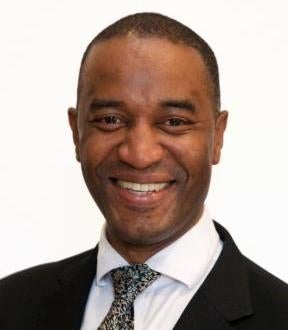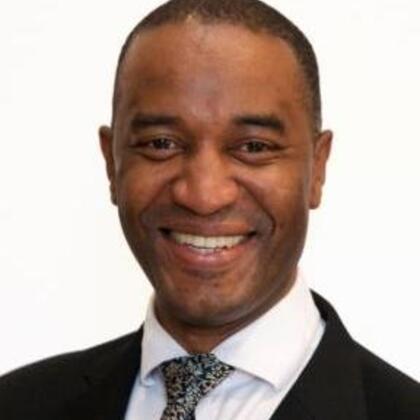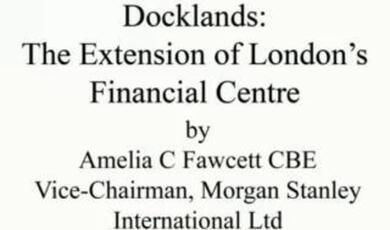23 April 2013
What Makes A Good Professional?
Good Professionals Are Annoying
Michael Parker CBE
I wanted to provoke so I am not going to give you too much of an academic representation. I am here to do what professionals are supposed to do: give you the hard-nosed truth, and despite what people say, my job is not to make life easy for you, it is to make you feel very uncomfortable, because that is what a professional does. And, despite what, dare I say, I am going to question whether university lecturers are truly professional because they are a trade. I think the good thing about a professional is he spends more time walking away than he does making sure he can keep the job, so the job is not as important, which is why it was the trade, so that you can be as independent as possible, because trust is key, and there is a different relationship when you are an employee than when you are a self-employed person, because you have a greater amount of freedom to say “Go forth and multiply” to your potential client than you do of your employer, and it was very important that people were independent.
Now, I am just going to stray a bit from the lecture: trust is vitally important. Some people say that “I am an accountant by trade” - we are the high priest of money, we are entrusted. The institutions around here – I mean, we talked about the Gresham legacy. He entrusted that to other people and it is important that we have people that we can trust to take forward the actual goals and objectives of other individuals based upon the expertise we have. So, I will come back to this quite often, but I just wanted to point out that that is what makes a wonderful professional, and that is what makes a professional annoying.
I am just going through this quick definition of a professional because some of it has already been alluded to. Trade skills. I am saying trade skills because anybody who has gone to university will tell you, normally, universities would only accept doctors and lawyers for training – the likes of accountants were deemed too dirty and nasty, although they have been around since the end of the nineteenth century. It was only about a century afterwards that they accepted them, mainly because of a nice little thing called money. Business schools made a lot of money, and that is why they did it, not because of the academic content, not because of the skills, but because the learning we are talking about with trade skills was a combination of some academic type of understanding as well as experience – you learnt on the job. It is only in the last 20 or 30 years that we have decided to embody more the academic and less the practical experience, but do so at your peril because if you are an accountant, that means you are no more than an MBA graduate, and if you can think of accountants without morals, that is what an MBA graduate is.
It is vitally important that you are trained to understand to do the trade and understand the boundaries by which you act. Earlier, Sir Roderick referred to those complex motives of individuals to do complex tax avoidance and things like that. Complex tax avoidance, to tell you the truth, has been around for as long as there has been professionals – they called them trusts. They were always tax efficient. They have always been around. Their popular use is different, because if you were from the great and the good and you had as much money as my Gresham friend did, you could entrust that money to others to look after it. When you were good established families, you entrusted it, your monies, to individuals, because sometimes your children were wayward because the money would corrupt them and make them drunk with power, and they would be prevented from being too wayward by having trusted individuals hold onto the money for the best of the individuals. That is what professionals are: they are people who are entrusted to do the right thing for the individual.
I will go one stage further: it is not just the right thing for the client, which does not mean we do what they want, it is what they need, it is also the best thing for society, and I will also go on to say that the public good is what distinguishes a profession from a trade, and it is vitally important we understand that distinction, otherwise we are no better than estate agents, when you are speaking to accountants, and some people think there is no difference anyway.
I wanted to point out that you need to have a competency to understand a technical skill, but also a competency to understand the associated ethics. Professional ethics is vitally important to establish a profession, and you need to be trained in that, and it is when you breach that, which is easier to do when you are an employee, that is when the problems start, right?
The other problem about it is, professions are like those children that turn around and say “The king has no clothes”, right, which is why politicians do not like them, because when they say something, they are embarrassed by a professional who says, “Well, that is not quite right because I have evidence that proves you are wrong,” and, I agree, it goes back to a big challenge from when, as far as some people who are political commentators say, we are all Thatcherite now, in that we are all individuals. Well, if we were all individuals, there would not be any charities. There would not be any public good. But it still happens. Why? Because people are not driven just by self-interest, and a professional is supposed to maintain standards even at the detriment to the client. They may do things that constitutes as tax avoidance – they will not be advising on tax evasion. It is vitally important to understand that, and that is why, when the Government produces bad legislation, it was an avoidance scheme that proved it was bad legislation. Rather than blaming the people that expose those politicians, it would be rather important that they looked at getting the legislation right in the first place, and dare I say, maybe even make politicians a bit more professional. But it is important to get the skills right.
The other thing is, how we know that, we create a set of standards. Most of the standards are public, so we know what we should be doing – everybody knows what we should be doing. They can get a bit technical, but it is important that we work towards something and develop those standards. So, we have something that is developing our understanding over time, so we make a large contribution there.
We are also regulated by a body. Now, some people I think, with the liberal professions, defined a profession because it is regulated or recognised in law. This is where the conspiracy theory comes through. It also brings in the definitions of the liberal professions, but I would argue that they do not always have all of these other criteria. A teacher, or a university lecturer, may be recognised, but it will not have a recognised body. A trade union is not a professional body. Just working for its own interest and not the public interest is not enough in my definition. So, regulated by a body normally means of its peers, but of late and creating other standards, we can have other people in, like the Government.
Working for public benefit and working with ethical guidelines is that which distinguishes a trade from a professional body, and that is what, on the basic definition, what I believe a profession is. It is not enough to be a good one.
They also adhere to a value-based decision-making. So, for the academics who want to get into this, decision-making normally is might is right, which is political decision-making, and then there is evidence-based decision-making, which is what most people push, where you have management information systems, normally nice computer software that churns data and gives you information. A professional will deal with an area for which, on occasion, there will not be all the information available for us to make the right decision. This is where the experience comes in, but also where the professional ethics comes in, because you are allowed to make what you believe is the right judgement, given the circumstances and the best information available. The decision-making process is a bit more than you would have in a trade – it is a bit more than self-interest. That is what is expected of an individual. Where we fail to resist, and this is where we get really annoying, when we resist, we are seen as annoying, but when we fail to do so, the quality of decision-making is reduced and we will suffer the consequences. I would argue, it does not really matter who we are dealing with, who we should be resisting, when it comes to decision-making, because we should stick to our guns based upon what we know and what we know should be happening.
Good professionals, effective, efficient and economic. There was an argument under the Thatcherite Government, that said professionals were just expensive cartels, and if you want to save money, all we should do is get somebody from the private sector, who would always do the job cheaper and just as good. Now, I am glad to say they only restricted that to accountants and estate agents, when it came to chartered surveyors, and it did not go to surgeons, because I am quite certain you will find somebody who will butcher you for half the money. I used to work at King’s College Hospital and I always said there are lots of people with knives who are willing to cut you open for their own personal gain, and they were not all called surgeons, right, but that has what happened in the era. You do not want that to happen in a free market economy. Now, we can go into neoclassical economics because that is really a politically-driven solution to what was seen as a problem with Marxist economics. It is not about doing the right thing – it is a political objective. The only problem about that: truth is one of those casualties in trying to prove a political objective, and our economy will show you how people do not understand how the economy works, but they can tell you what the political objective is. That is my concern, and I think we need more accountants in economics in order to get this subject area pushed forward.
Let us get onto the really annoying things… Why are we supposed to be annoying? Mainly, and we have started with it, we are supposed to resist requests to deliver political objectives. I think our failure has been that we have complied with what the Government wants because it is sexy. So, we are all Thatcherite, we are all individualists, and therefore, we are going to compromise that which is the very essence of our definition in order to satisfy a few well-meaning political individuals that may have might and power, and in so doing, we devalue the status of our profession. If we do not resist – and I do not care whether it is left or right – and stand up for our professional training and our ethical standards and that which we know to be truth, then we deserve the treatment that we get. We will not have any respect with anybody because they know that, if they push us enough, we will move away from, dare I say, tax avoidance and we will be perceived to be willing to do tax evasion.
Accountants in certain countries – there was an old joke that said I am a businessman, I am seeking to employ an accountant, I have some questions, right? I have got a problem with my cash-flow, I need some money, I am making a loss of £10 per minute – what do I do? The first accountant says, “You declare the £10 and you go and negotiate with the bank manager.” Thank you very much, goodbye. The second person comes in, “Yes, but we can start restructuring the business and see how we can get the £10 down and then start negotiating with the bank manager.” He gets dismissed. The third person comes in and says, “I will make the £10 loss any number you want.” You get the job. This is the fear of what happens to a professional, if you only let money, might, self-interest be the primary guide to what you do and what the profession is perceived to do. Such activities happen too often. The need to keep the mortgage going, keep the family wealthy, has been so great that it has caused us, some individuals, to question true judgement. The unwillingness not to stand up and say “What you are doing is wrong” or the willingness to talk away from a job or a position or a contract because they have asked you to be unprofessional is insufficient. It is insufficient for us all and I think we should be turning around and saying, far more often, it is wrong, and making sure people are aware that such requests are wrong.
The other two areas, technically, are easier to resist. I say “corrupt objectives”, but we have seen too many organisations get exposed for doing corrupt things and yet nobody stood up. We can talk about Enron and people like that, where the accountants are shredding papers for and on behalf of the client…who is doing the corrupt activity, right…? We have to ask questions about that.
One of the things I am annoyed with, the professional normally says, when that happened, we do not have a go at the Big 4 for their shredding capabilities, we normally regulate more harshly the smaller firms who do not shred paper, right? Just in case there are some Big 4 people down there, I am just trying to stir things up a bit. We really do need to ask questions. Is it all about adherence and obeisance, or is it truly about being professional? And this really could seriously be detrimental to your financial health.
So, I am going to push that those corrupt objectives are very important because, when we are doing things which are bordering on tax evasion, we should be standing up and walking away or preventing the individual, company, client, from doing so. It does not happen often enough. And if you do so, you do not normally get the reward and compensation that you would probably expect if you kept your mouth quiet.
I am really passionate about this because, when it comes to health, we have decisions by professions where people’s lives depend upon it, and I would argue what we should have is systems which should be pushing us towards making sure, not that the professional produces lots more pieces of paper, but we deal with the drivers that saves lives and maintains people’s best health. It is vitally important that the medical profession remembers those principles by which other professions learnt professional ethics. They are under pressure by management to make decisions which contradict their professional ethics, and I would argue, and this is where I think Mid Staffs’ Inquiry Report did not go far enough, rather than demanding more and more for less and less, from professionals in employment, what they should be doing is making sure there is more formal recognition of the status and position of a professional, and provide appropriate protection, because we have a battle right now between the Royal College of Nursing and the State about what should be happening. I would argue what we should be doing is taking away the drivers that creates the pressure on the professional, and that instead of trying to sack the professional, this asks questions of who is asking those professionals to be unprofessional, and, I would argue, corrupt or even negligent. We should be looking at those drivers and saying the right thing for the public is to provide the right care for the individual, and that goes beyond the other relationships, which are normally financial, because, literally, our lives depend upon that. Making sure we have those right governance systems in an organisation, whether it be a hospital or somebody selling insurance, is what creates that trust with the public. As soon as you break that down, and it will be exposed at some time, right, people question us and people question the system, and if you question the system, the economy, that establishment, starts to fall apart.
That is why I think it is vitally important that not just accountants, but all professional individuals are annoying. It is not just that they resist all of these pressures, but they are supported by their collective body to do the right thing, irrespective of whom they are standing against. And it is vitally important that we have those professions who are willing to say to the Government that there are problems with the system if you are really interested in doing a public good and you have entrusted us with the responsibility of delivering a specialist service, which is there for the benefit of the public and of our individual clients – you need to act accordingly. It is not just enough for you to be concerned about your political objective. It is about understanding the decision-making in the future will be about how professions take on other positions of authority that are involved in a decision-making process.
I have elevated this slightly to just more annoying to making sure we are annoying on an individual basis but on a national basis, or dare I say, international basis, because great things, I think, in the 21st Century, will be expected of the professional who is the leader, because professional decision-making is about the value-based decision-making. That is the future, and that value-based decision-making will be annoying to anybody else who thinks might is right, whether they be soldiers or whether they just be elected individuals. That is what I am hoping we will make sure that people coming out of here will encourage those who wish to be professionals to embrace and take forward. It is the shape of things to come, because if we are not annoying, we are not doing our job.
© Michael Parker CBE, 2013


 Login
Login







